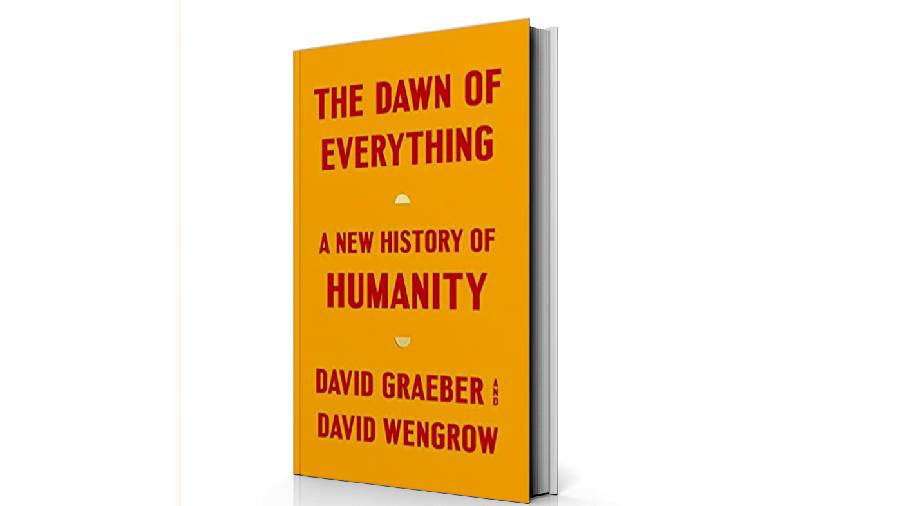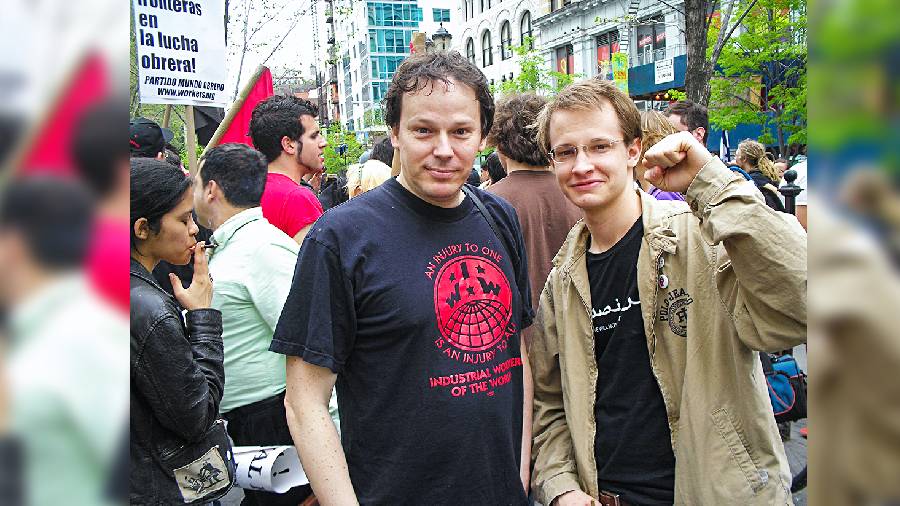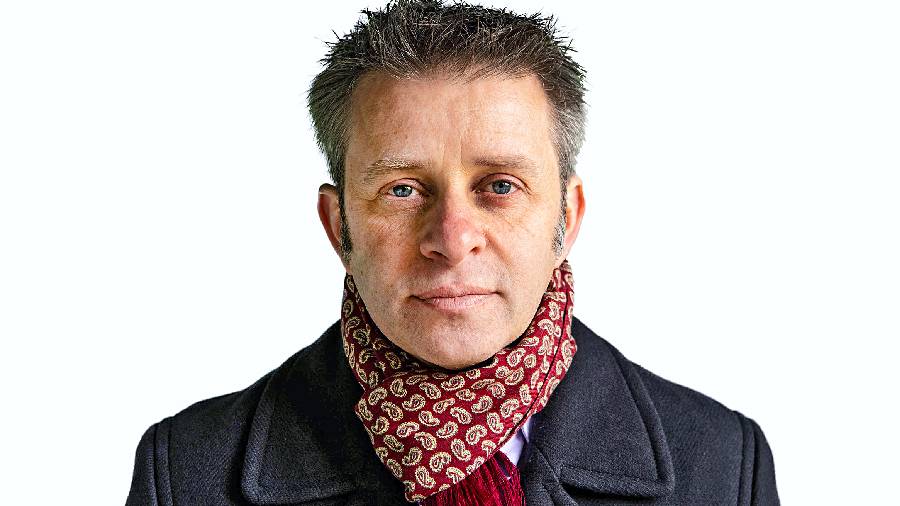Applauded as a classic, a pathbreaking work of significant magnitude, The Dawn of Everything: A New History of Humanity by David Graeber and David Wengrow set out to revise our understanding of the early history of the human species: not of our earliest evolutionary beginnings, but mostly, of the thousands of years between the beginning of the Holocene and the spread of increasingly powerful states that produced the current world systems of governance, power,materialism and stratification.
Divided into 12 lucidly presented chapters, Graeber and Wengrow’s dazzling ideas find inventive expression with equally innovative chapter headings which sign post their easy, persuasive style. For instance, the first three are Farewell to Humanity’s Childhood — Or, why this is not a book about the origins of inequality; Wicked Liberty — The indigenous critique and the myth of progress; and Unfreezing the Ice Age— In and out of chains: the protean possibilities of human politics.
The Dawn of Everything is often located on the same shelf that might house Clive Ponting’s Green History of the World, Paul Strathern’s Empire, and Peter Frankopan’s The New Silk Road, etal. Ponting’s bestseller examines the complex relationship between ecology and human history. Straddling civilisations as separate as Easter Island and the Romanempire, Egypt and Sumeria, the book takes a detailed look.
Ponting’s argument points to evidence that human beings have repeatedly built societies that have flourished by mining to extinction the Earth’s resources, only to explode to the point “where those resources could no longer sustain the societies’ populations and cause subsequent collapse”.
Another study that relooks at history through a new lens is Paul Strathern’s, who launches the story of Empire with the Akkadian civilisation. This civilisation ruled over a vast expanse of the region of ancient Mesopotamia, then turns to the immense Roman Empire, where we trace back our Western and Eastern anchors.
The New Silk Road by Peter Frankopan takes a fresh look at the relationships being formed along the length and breadth of the ancient trade routes today. He writes: “The world is changing dramatically and in an age of Brexit and Trump, the themes of isolation and fragmentation permeating the Western world stand in sharp contrast to events along the Silk Roads, where ties are being strengthened and mutual cooperation established. This prescient contemporary history is a timely reminder that we live in a world that is profoundly interconnected.
In her 1994 book Women’s Work, Elizabeth Wayland Barber explores women’s role in early technological development, particularly textile making; Steven Mithen’s After the Ice Age: A Global Human History (2004) is an imaginative tour of world archaeological sites during the agricultural revolution; Lauren Ristvet (2007) In the Beginning: World History from Human Evolution to the First States is a must-read. RomilaThapar’s Asoka and a Decline of the Mauryas is a masterpiece. Is there any intersectionality among these studies and this book?
All these authors seem driven to write a reassessment as it were of how humans evolved. By tracing connections across millennia and shining new light on major civilisations — from the Mongol Empire and the Yuan Dynasty to the Aztec and Ottoman, through to the most recent and biggest empires: the British, Russo-Soviet, and American — many of the younger historians seek a release from telling the story from a traditional perspective.
Charting 5,000 years of global history in a dozen lucid chapters,The Dawn of Everything makes comprehensive and inspiring reading to anyone fascinated by the history of the world.
So, what are the principal claims that Graeber and Wengrow make? Walter Scheidel, in the journal Cliodynamics (2022), suggests: “Unlike their present day remnants, ancestral foragers were not necessarily confined to small bands;farming matured very slowly and hybrid foraging farming arrangements endured for millennia; crude stage models of social evolution fail to do justice to the complexities of the historical experience; early cities did not immediately spawn autocracies or even avoided them altogether; early polities were much more limited in scope than modern states; one to two dozen generations ago, some indigenous North Americans chose to turn away from farming and unequal arrangements and developed a political philosophy that inspired European Enlightenment thinkers; the richness of the historical experience revealed by this book suggests meaningful alternatives to our current way of life and can therefore support social activism today.
“The authors present these positions as more or less novel or at least unfamiliar beyond narrow circles of specialists who fail to communicate them more widely or coherently, and frequently as conflicting with prevailing academic opinion.” Their corequest, reiterated throughout the exhaustive work is, according to Scheidel, “How did we, as a species,‘get stuck’ in a single mode of hierarchical submission to political and other authorities? ”So the issue of power and the stratification of society which has vexed philosophers, historians, social scientists, political scientists, anthropologists, literature specialists, and now archaeologists, is once again being excavated in this new history of humanity.
In a touching conclusion to the Acknowledgements, Wengrow writes: “...My last and deepest thanks to Ewa Domaradzka for providing both the sharpest criticism and the most devoted support a partner could wish for; you came into my life, much as David and this book did: ‘Rain riding suddenly out of the air, Battering the bare walls of the sun... Rain, rain on dry ground!’
If there is a spirit present in this accessible book of refreshing thoughts, that dazzles with grace and concision, it surely is the essence of David Graeber activist, braveheart and genius.
ABOUT DAVID WENGROW AND DAVID GRAEBER
DAVID WENGROW is a British archaeologist and Professor of Comparative Archaeology at the Institute of Archaeology, University College London. He has co-authored the New York Times international bestseller The Dawn of Everything, which was a finalist for the 2022 Orwell Prize. He has conducted archaeological fieldwork in Africa and the Middle East and is the author of books including The Archaeology of Early Egypt: Social Transformations in North-East Africa,c. 10,000 - 2650 BC; What Makes Civilization? The Ancient Near East and the Future of the West; and The Origins of the Monsters: Image & Cognition in the First Age of Mechanical Reproduction. He has also contributed many op-eds on climate changes and inequality in The Guardian and The New York Times which has led him to rank #10 in ArtReview’s (2021) ‘Most Influential people in the contemporary art world’.
DAVID ROLFE GRAEBER, the primary author of The History of Everything, died in 2020 at the age of 59. David Graeber was a professor of anthropology at the London School of Economics. He is the author of Debt: The First 5,000 Years and Bullshit Jobs: A Theory, and was a contributor to Harper’s Magazine, The Guardian, and The Baffler. An iconic thinker and renowned activist, his early efforts helped to make Occupy Wall Street an era-defining movement. Known as a genius, who endeared himself to colleagues, friends and students and who left a lasting legacy he brought a veracity and fearlessness to academia that makes him a hero for many young scholars.
In his own words, this is what he says: “I received a PhD in1996, and then held a series of academic jobs. These included some graduate teaching at Chicago, though admittedly not much, a year at Haverford, a year of unemployment including a visiting scholar status and one course at NYU, and a junior faculty position at Yale. In 2004, the Yale department voted not to continue my contract, before I could begin the process of coming up for tenure. This was a very unusual procedure where new rules had to be invented for my case (i.e., no student or outside reviews were allowed.) Yale gave no reason for its decision other than dissatisfaction with my scholarship but some felt it might not have been entirely irrelevant that I was by this time quite active in the Global Justice Movement and other anarchist inspired projects.
“After Yale I found myself unemployable in my own country, but for some mysterious reason, being avidly shopped pretty much everywhere else. I ended up at Goldsmiths, University of London, from 2007-2013, working with inspiring colleagues and wonderful students, and now, as a full professor, at the London School of Economics, where I am surrounded by some of the best and most interesting people one could hope to be around. ....
“I told a magazine once that I’ve been an anarchist since I was 16, so I guess that must be true, but I only really became active in any meaningful way after the beginning 2000, when I threw myself into the Alter-Globalization movement and it might be said that all my work since has been exploring the relation between anthropology as an intellectual pursuit, and practical attempts to create a free society, free, at least, of capitalism, patriarchy, and coercive state bureaucracies. “As a result I sometimes feel I’ve had to pursue two full-time careers of research and writing, one peer-reviewed, the other not, since in my activist-oriented work I am interested in trying to ask the sort of question those actively engaged in trying to change the world find useful or important, rather than those of funders and those influenced by same. ”

The Dawn of Everything: A new History of Humanity Authors: David Graeber and David Wengrow Publisher: Penguin Pages: 704 Price: £12.99

David Graeber at a protest

David Graeber

JULIE BANERJEE MEHTA
